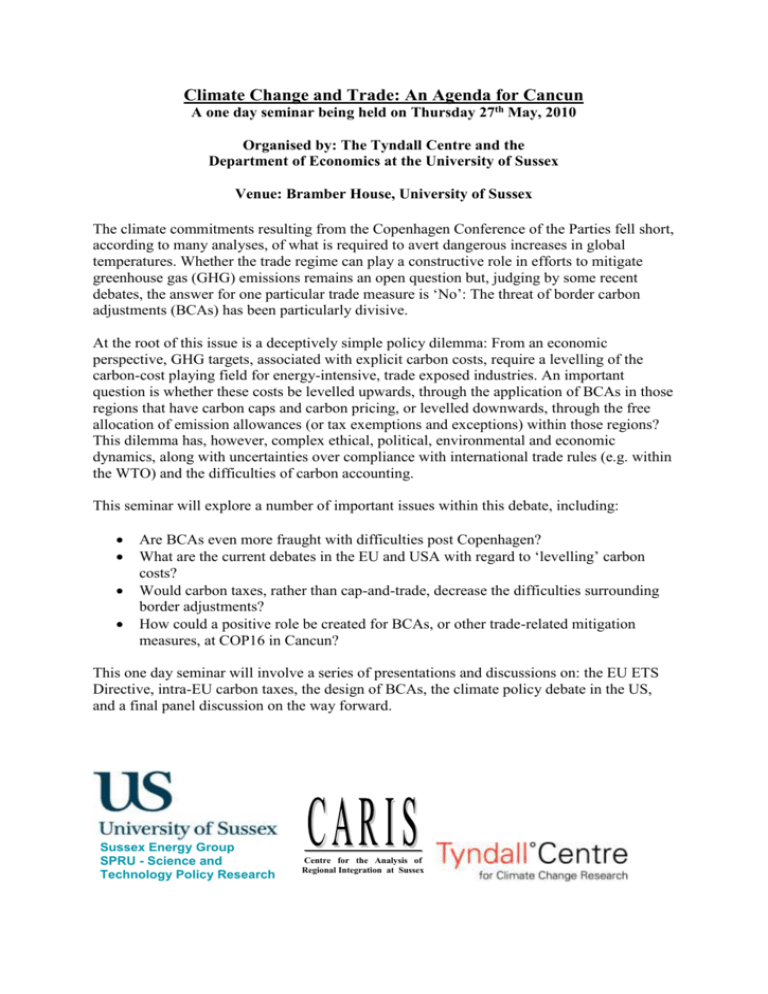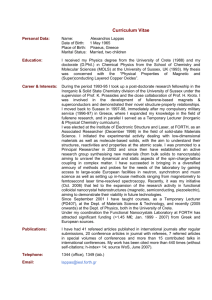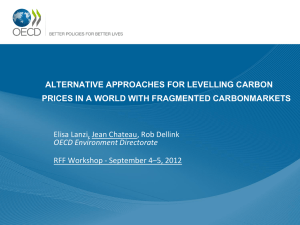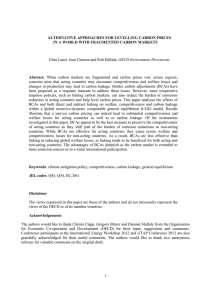programm - University of Sussex
advertisement

Climate Change and Trade: An Agenda for Cancun A one day seminar being held on Thursday 27th May, 2010 Organised by: The Tyndall Centre and the Department of Economics at the University of Sussex Venue: Bramber House, University of Sussex The climate commitments resulting from the Copenhagen Conference of the Parties fell short, according to many analyses, of what is required to avert dangerous increases in global temperatures. Whether the trade regime can play a constructive role in efforts to mitigate greenhouse gas (GHG) emissions remains an open question but, judging by some recent debates, the answer for one particular trade measure is ‘No’: The threat of border carbon adjustments (BCAs) has been particularly divisive. At the root of this issue is a deceptively simple policy dilemma: From an economic perspective, GHG targets, associated with explicit carbon costs, require a levelling of the carbon-cost playing field for energy-intensive, trade exposed industries. An important question is whether these costs be levelled upwards, through the application of BCAs in those regions that have carbon caps and carbon pricing, or levelled downwards, through the free allocation of emission allowances (or tax exemptions and exceptions) within those regions? This dilemma has, however, complex ethical, political, environmental and economic dynamics, along with uncertainties over compliance with international trade rules (e.g. within the WTO) and the difficulties of carbon accounting. This seminar will explore a number of important issues within this debate, including: Are BCAs even more fraught with difficulties post Copenhagen? What are the current debates in the EU and USA with regard to ‘levelling’ carbon costs? Would carbon taxes, rather than cap-and-trade, decrease the difficulties surrounding border adjustments? How could a positive role be created for BCAs, or other trade-related mitigation measures, at COP16 in Cancun? This one day seminar will involve a series of presentations and discussions on: the EU ETS Directive, intra-EU carbon taxes, the design of BCAs, the climate policy debate in the US, and a final panel discussion on the way forward. Sussex Energy Group SPRU - Science and Technology Policy Research Centre for the Analysis of Regional Integration at Sussex Climate Change and Trade: An Agenda for Cancun 09.00-09.30 Arrival / Coffee Session 1 – Setting the scene Chair: Jim Rollo, Department of Economics, University of Sussex 09.30-10.30 Introductory remarks by the organisers, followed by speaker(s) to give his/her outlook on the most salient difficulties BCAs create for the trade and climate regimes and ways to overcome them. Has Copenhagen changed the contextual framework for the debate over BCAs in any useful way? Welcome address: Jim Watson (Sussex Energy Group, University of Sussex and Tyndall Centre) Peter Holmes (Economics Dept., University of Sussex) Keynote speakers: Aaron Cosbey (Associate and Senior Advisor in Trade and Investment, IISD). Jarek Pietras (Director General for Environment at the Council of the EU) Session 2 – Policy within the EU Chair: Jim Watson, Sussex Energy Group, University of Sussex 10.30-11.30 The EU ETS, with particular reference to the report due by 30 June which includes decisions on: free allocation; the possible “inclusion in the Community scheme of importers”; and how sectoral agreements may influence EU policy. What are the current approaches towards, and standings of, these three policies? Kateryna Holzer (World Trade Institute, University of Bern) ‘WTO Constraints of Carbon-related Border Adjustments’ Susanne Dröge (Head of Global Issues, SWP, German Institute for International and Security Affairs) 11.30-11.50: Coffee 11.50-13.00 The BCA debate: competitiveness vs environmental concerns. The scale of “leakages”. The implications of alternative BCA mechanisms and the devil in the detail of origin vs destination charges at the EU's external and internal borders. Peter Holmes / Jim Rollo (Department of Economics, University of Sussex). ‘Border Carbon Adjustments and the Potential for Protectionism’ Bertin Martens (Deputy Chief Economist, DG Trade, Commission of the EC) ‘The potential for leakage and the options to deal with it’ 13.00-13.45: Lunch Session 3 – Regional and global policies Chair: Peter Holmes, Department of Economics, University of Sussex 13.45-15.30 The current debates in the US with respect to BCAs. How have they changed since Copenhagen? How do we avoid the same problems at COP16? What are the current discussions on the issues raised by BCAs for international trade law? Arthur Appleton (Partner, International Trade and Arbitration, Appleton Luff – International Lawyers, Geneva) Carolyn Fischer (Senior Fellow, Resources for the Future) “The Role of BCAs in U.S. Legislative Proposals” Jock Whittlesey (Environment Counsellor, US Embassy, London) ‘Climate Change Policy under the Obama Administration’ 15.30-15:50: Tea break Session 4 – Ways forward Chair: Jim Rollo, Department of Economics, University of Sussex 15.50 – 16.45 Panel discussion to reflect on the day and on possible contribution of trade measures to climate policy in the run up to the next Conference of the Parties in Cancun, Mexico. Panellists to include: Susanne Dröge 16:45: Closing remarks Jim Watson, Sussex Energy Group, University of Sussex 17:00 Close of meeting

![Expectations of an Associate Tutor [DOCX 48.11KB]](http://s3.studylib.net/store/data/006817972_1-1b02bdb328757c6633bf3d39d22408ee-300x300.png)

![CIRCY Seminar Series Promo: 26jan2015 [DOC 142.00KB]](http://s3.studylib.net/store/data/007363269_1-24e000a78790eb65e62cb951852f8dfe-300x300.png)


